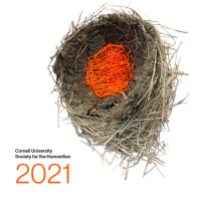2020-21 was the year of Fabrication, and it was a fellowship year like none other. With a theme, planned long before the pandemic, that invited making and crafting, thinking creatively with things, collaborating hands-on in the classroom, we instead found ourselves – like everyone else – conducting the year remotely, meeting weekly in the hands-off virtual spaces of Zoom. But this could not dampen our intellectual and creative collaborative spirit!
Click to read our 2021 Newsletter online.
With an amazingly generous, flexible, and brilliant group of fellows we quickly found Fabrication to be richly capacious, no less compelling or productive for the turn to the virtual. From emotions and identities (among early Christians and ancient Roman slaves) to craft, creatures, and belief (in Middle English poetry and Thai Buddhism); from fashion, clothing, and the narratives constructed around them (in the Harlem Renaissance and university fashion collections) to forensic performance and the fabrication of gender, we discussed myths and origin stories, truth and lies, craftiness and skill – all the while reflecting on the ways our own research, teaching, and writing are themselves fabrications of widely varying sorts. Each Zoom discussion was lively, directed, focused; and each yielded an unexpected bonus: the Zoom Chat with its fabulous scholarly and creative marginalia of spontaneous comments, tangential ideas, spur-of the-moment reactions, conversational asides, and deeply useful suggestions for further reading. It was an intense, productive, positive, and truly memorable fellowship year.
Equally exciting this year was the launch of our new Humanities Scholar program with its focus on undergraduate humanities research. Under the leadership of Professor Durba Ghosh (History), the Humanities Scholar Program inaugural year exceeded its target cohort of 30, welcoming 32 rising sophomores to the Society for a as part of a drive designed to give further focus, intensity, and visibility to undergraduate humanities research at Cornell. In special Zoom sessions, students discussed the centrality of the humanities with President Martha Pollack and Provost Mike Kotlikoff, and concluded the year with a collaborative research project drawn from Cornell archives on the complicated legacy of Goldwin Smith.
Despite the pandemic we were able to have a full year of productive work in the Rural Humanities initiative, the Society’s multi-year Andrew W. Mellon public and engaged grant for research on and with the Central New York community. Taking inspiration from Black Lives Matter and the #DoBetterCornell initiative, we dedicated our collective energies to a special focus on the largely forgotten and effaced Rural Black Lives, both historically and in the present day. Microgrants were available to undergraduate and graduate students for projects such as a podcast on rural poetics or the effects of gentrification in and around Ithaca. Faculty developed ongoing research projects on Black land ownership in rural New York; opioids and rural Black populations; Black and Indigenous histories and futures in New York State; or the newly re-discovered Black female composer Florence Price. The spring Rural Humanities seminar, led by Gerard Aching (Africana) and Anu Rangarajan (Small Farms Program), addressed the legacy of the underground railroad in Ithaca and central New York as well as the dynamic but often forgotten presence of Black farmers throughout the state. In 2021-22, Rural Humanities is excited to collaborate with Cornell’s American Indian and Indigenous Studies Program with a focus on Rural Indigenous Lives.
This was the year of reaching out to, and creating, virtual communities. With that in mind, and eager to bring the work of humanists at Cornell to wider audiences, we launched our new podcast, The Humanities Pod. Produced entirely in-house, our first six-episode series features conversations on Indigenous dispossession and the founding of Cornell with Jon Parmenter and guest Michael Witgen; misogyny, himpathy, and gaslighting with Kate Manne; shaping emotions in late ancient Christianity with Georgia Frank; sartorial self-fashioning and legacies of enslavement with Kimberly Lamm; and crafting belief with Adin Lears and Anthony Irwin. There will be much more in the coming year!
Our turn to the virtual also included the annual Society Invitational lecture, given by Kate Manne “He Said, She Listened: Mansplaining, Gaslighting, and Epistemic Entitlement,” co-hosted by e-Cornell, and reaching several thousand viewers around the world. Likewise, we presented the annual Digital Humanities Lecture virtually, with Marisa Parham, director of the African American Digital Humanities initiative, and visiting professor of English at the University of Maryland. Her talk, “Interactives I: difference and digital textuality,” discussed her projects at the intersections of Black expressive traditions, digital humanities, and electronic literature. Next year we plan to continue with a combination of in-person and virtual events, hoping to continue to reach far beyond the Cornell campus.
Finally, we look ahead to our focal theme for 2022-23: Repair. As parts of the world emerge from the pandemic and others remain mired in the unequal distribution of vaccines, logistics, or simple denial; as the fight for racial justice continues; as the climate crisis becomes ever more present; as democracy continues to be tested, we find ourselves in a world in need of repair. Repair calls to mind practices of care, craft, and conservation as well as the exigencies of restoration and reparation. With the theme of repair, we invite reflection on how things fall apart and thus on how objects, relations, and histories are made, as well as how they can be re-made, made differently. We hope you join us!
Annette Richards
Paul Fleming

